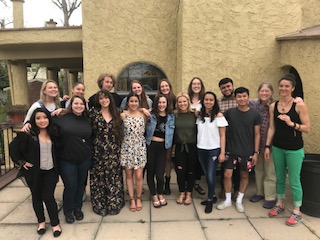
The Outside Students and Dr. Belknap from the CU-Colorado Correctional Center Inside-Out Prison Exchange Class. (Photo courtesy of Scott Summers)
At Camp George West, a men’s prison in Golden, Colo., CU students and inmates met to celebrate the work they’ve both put into the semester through participation in a weekly class.
The social justice and ethnic studies class at CU brings undergraduates, called “outside students,” into a prison every week. There, they got the opportunity to work with incarcerated men (named “inside students”) every Wednesday.
The class discussed racism, the incarceration system and ways to have a better life after parole. Inmates who were invited to be in the class fulfilled the requisites of holding a GED and not being incarcerated for any crime of a sexual nature.
This is CU’s second year providing such a class, allowing CU students and incarcerated students to gain college credit. Last year, the course took place inside of a women’s prison. The program is supported and in partnership with the Inside Out Prison Exchange Program.
Friday was the last class and graduation ceremony for the course. Both inside and outside students had the opportunity to show off their work from the semester and celebrate with family and friends.
“I’m really excited to meet the families of the inside students because you make these bonds and want to meet the people who are important to them,” said Tory, a CU student. Students in the program were not allowed to reveal their last names to members of the program.
The 16 inside students and 16 outside students worked on service projects aimed at tackling social issues. Professor Joanne Belknap, the course instructor, commented on the unique nature of the projects.
Belknap explained that many of the men in the prison work on a roadside crew, picking up trash for over 40 hours a week. One of them had been working with the Colorado Department of Transportation and had an idea for all the recyclables to be sold and the profits be used to donate to women’s shelters.
Another group planned a job fair for prisoners to set up work for when they finish their time in the prison. The group plans to implement the project in the fall.
At the celebration, the Colorado State Patrol donated all the money for the night’s food, which the inside students baked and prepared.
Elise, another CU student, reflected on the class’ impact and how it encouraged some prison inmates to seek higher education upon parole.
“For me, it was emotional, and it didn’t really hit me until the inside students started saying goodbye to their families,” Elise said. “Seeing the look on some of their faces telling their kids they’d see them soon was really hard.”
CU student Alma was able to meet people that she identified with through the class. She explained that she could have ended up where they were as someone born in Mexico to parents who never graduated high school. She found that she wasn’t so different than those inside the prison.
At the ceremony, Alma was introduced to the two college-bound daughters of one of the inside students. The inside student used Alma as an example for his daughters, telling them that she struggled just like them, and that if she could do it, they could too.
“I told the outside students that it’s crazy that we have to come to a prison to understand how messed up our system is,” Alma said. “It’s not just ‘he’s a criminal,’ there’s a structure to how these people become criminals.”
The evening was marked by a graduation ceremony where Professor Belknap presented diplomas to each student and read paragraphs from the class readings.
Belknap was also joined by David Russell, a teacher at the prison who selected the inmates for the class. On the night of graduation, Russell was celebrated for his work over the semester with a plaque signed by all of the students.
ETHN 3101-801 is scheduled to be offered again in spring 2019, taught by Belknap. The admission process is competitive and requires students to submit essays explaining their desire to take the class.
Contact CU Independent News Staff Writer John Fitzmaurice at john.fitzmaurice@colorado.edu.
